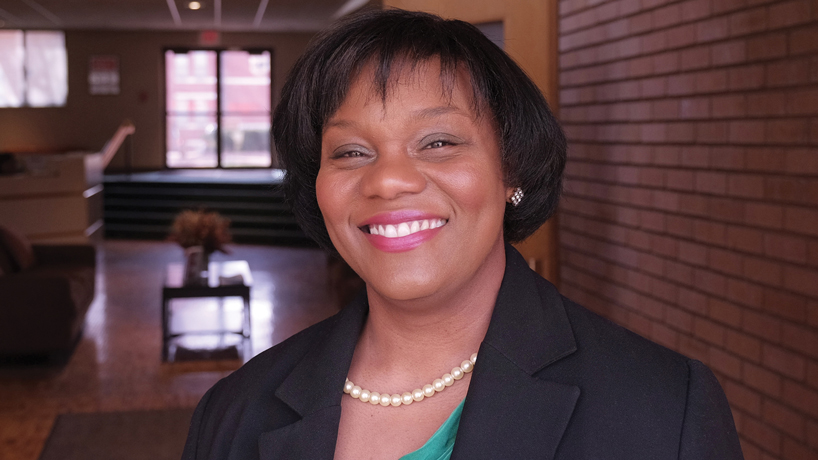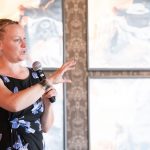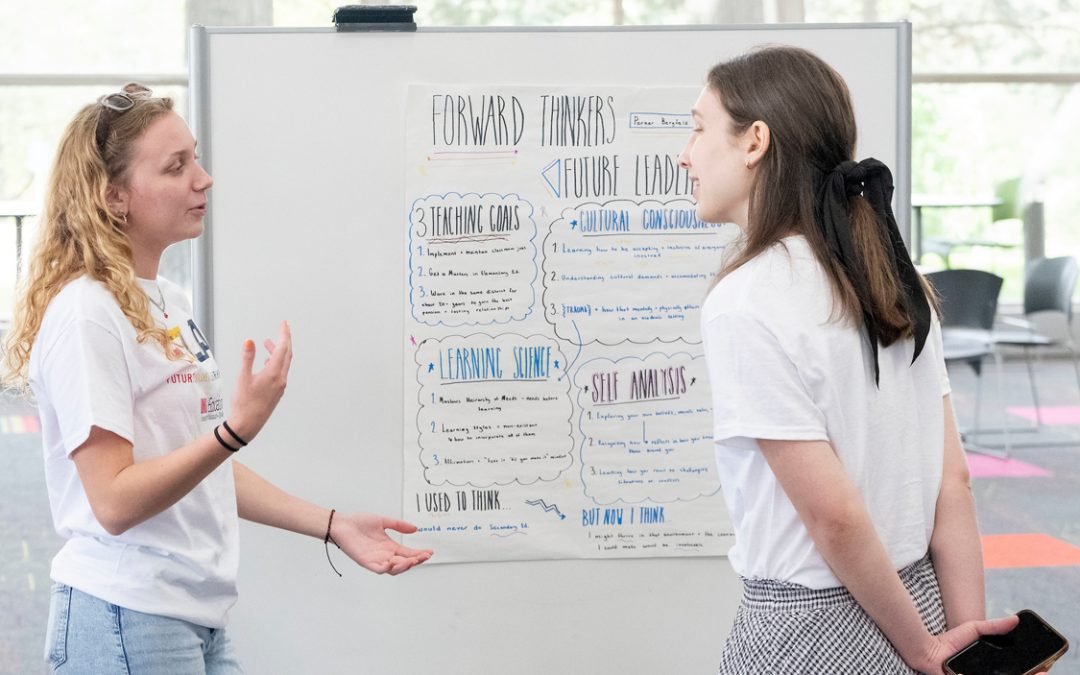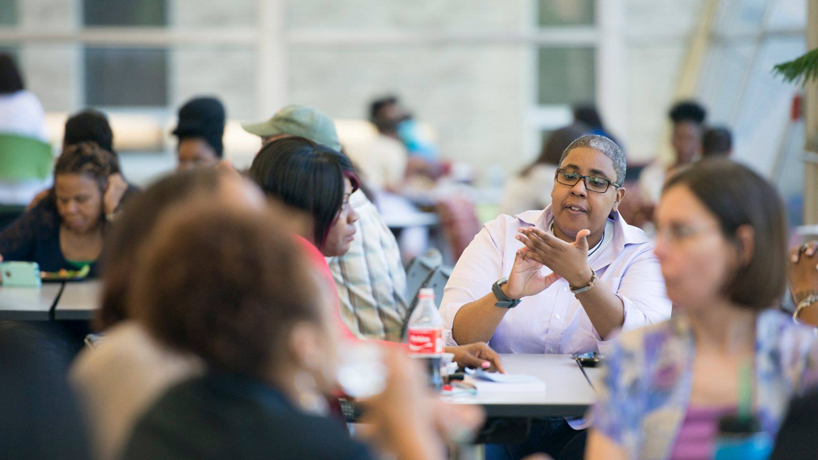
The Crooked Room Conference at UMSL was a one-day, open-to-the-public, free event centered around exploring and improving the educational experiences of young black women and girls. (Photo courtesy of the Crooked Room Conference)
Registration for the Crooked Room Conference at the University of Missouri–St. Louis maxed out in only two days. In fact, the event – held June 10 in the College of Education’s ED Collabitat – was nearly standing room only.
The free, open-to-the-public conference provided something that not many academic endeavors have traditionally offered: a stage, a spotlight and a microphone specifically for the voices of young black women and girls.
Born out of the teaching of Associate Professor Matthew Davis, who leads a racial justice in education doctoral community at UMSL, the conference derived its name from the “crooked room” philosophy that renowned scholar Melissa Harris-Perry put forth in her book, “Sister Citizen: Shame, Stereotypes, and Black Women in America.”
The crooked room, Harris-Perry posits, is the distorted space full of silence, shame and racialized social constructs in which black girls and women have been forced to live throughout history and into the present day – one that has shaped and thwarted their experiences as well as their citizenship.
Doctoral student Jaqui Melton said such scholarship was the perfect foundation for the conference. She, along with two of her College of Education peers – ēNiCōL and Amber Bell-Christian – planned and organized the event under Davis’s guidance.
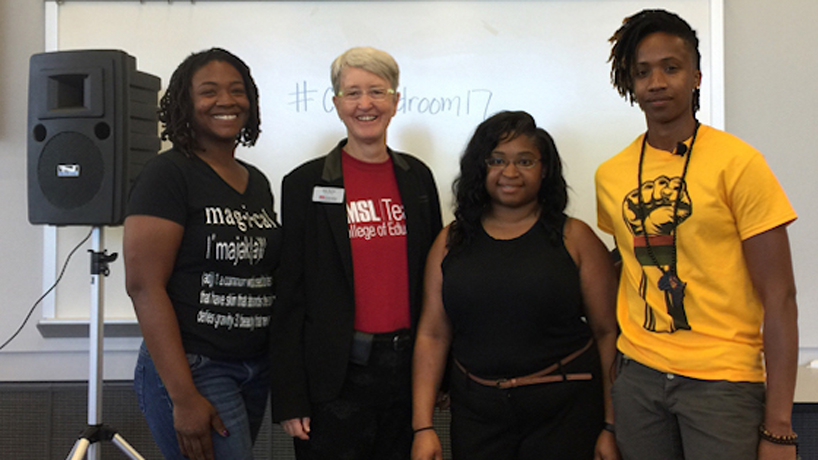
College of Education Interim Dean Ann Taylor (red shirt) poses with conference organizers, from left, Jaqui Melton, Amber Bell-Christian and ēNiCōL. (Photo courtesy of the Crooked Room Conference)
“We felt that Melissa Harris-Perry’s work was the most recent work to capture what it feels like to navigate institutional spaces with a black woman’s identity,” Melton said, “to always have to walk into spaces where you’ve already been contextualized and assigned a role.”
Challenging and breaking down those stereotypical identities – particularly as they affect the education of black girls – was at the heart of the organizers’ efforts.
Yet even as they began to plan, the pervasiveness of the crooked room theory made itself known.
“When we first came to the table to brainstorm and ask ourselves whose voices we wanted to invite and raise, we knew right away that we wanted our efforts to be centered around all black girls and women.” Melton said. “Still, even for the three of us – who all identify as black women – it felt like there was a brief moment of hesitation, a question of ‘Can we really do this? Can we make all of the presenters and panelists black women and girls?’ Then, of course, we immediately said yes. Not only yes but that we must – we have to. We knew there was a space and a tremendous need for this.”
Beyond that need, inclusivity and accessibility were the driving forces behind the conference mission. Melton and her fellow organizers purposefully didn’t place specifications on presenters, kept the conference open to anyone who would like to attend and kept it free so that cost wouldn’t be a prohibitive factor.
As a result, everyone present at the Crooked Room Conference wasn’t an educator or scholar in the traditional sense of the word. While the education of young black women was the theme that ran through the day’s presentations, each presenter’s avenue for exploring that theme was varied and diverse – and the speakers ranged in both age and experience.
“We had everyone from a 14-year-old middle schooler and young student activist to mothers and artists, musicians and performers, teachers and entrepreneurs,” Melton said.
In fact, one of the most memorable and powerful moments – on a day that had many – occurred as Melton facilitated a panel for youth and young adult attendees.
“Just the energy in the space then; it brought me to tears,” she said. “I felt the healing in the room as these young women were telling their stories and realizing it was ok to tell their stories and that there were people there to listen.”
The keynote speaker for the day was UMSL alumna Amy Hunter, who, while currently the manager of diversity and inclusion for St. Louis Children’s Hospital, has written and spoken extensively on issues related to race, racism and the black female experience for national outlets, including The Huffington Post, Essence magazine, CNN, NPR and TEDx Talks.
During a passionate and heartfelt keynote, she briefly touched on how the 2014 death of Michael Brown in Ferguson, Missouri – and the resulting unrest that ensued – affected her and spurred her into action. But she also connected the events of that summer – and the many other tragic incidents like it that have occurred since – back to young black women and those crooked rooms.
“We have spent an enormous amount of time talking about black men,” Hunter said. “Every time we have lost a black man, either to mass incarceration or to crime or to death or to mental illness or whatever we have lost them for, there is at least one woman attached to him. How is she?
“We have to fight for our girls,” Hunter continued. “The reason we don’t have to have the ‘driving while black’ conversation with our girls is because we’ve stolen their voices long before that.”
The Crooked Room Conference, now intended as an annual event, aims to be a part of changing that.
Media Coverage
St. Louis Public Radio

